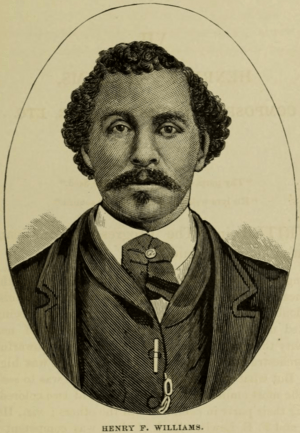Henry F. Williams facts for kids
Quick facts for kids
Henry F. Williams
|
|
|---|---|

Image of Williams from 1887
|
|
| Born | August 13, 1813 Boston, Massachusetts, U.S.
|
| Died | c. 1903 (aged 89–90) Boston, Massachusetts, U.S.
|
| Alma mater | New England Conservatory of Music |
| Occupation | Musician, educator |
Henry F. Williams (born August 13, 1813 – died around 1903) was a talented musician and composer. He lived in Boston, Massachusetts, during the late 1800s. Henry Williams was one of only two Black musicians to perform in a huge orchestra. This orchestra played at the 1872 National Peace Jubilee. Many people loved his musical arrangements. Later in his life, he mostly taught music. Some people say Williams was the second most famous Black composer of his time. He was known after Frank Johnson, a musician he worked with.
Contents
Henry Williams' Early Life
Henry F. Williams, also known as Harry, was born in Boston, Massachusetts. His birthday was August 13, 1813. He started learning music when he was just seven years old. As a young man, he studied with Peter Albrecht von Hagen, Jr.. He also studied with Alfred Howard and Henry Thacker until he was 21. Williams graduated from the New England Conservatory of Music in Boston. In the early 1840s, he had his own music studio in Boston.
A Musician's Career
Williams mainly played the violin, double bass, and cornet. He especially liked the violin and cornet. But he also played the violoncello, baritone trombone, piano-forte, and tuba. He taught many of these instruments too. Henry Williams was also a well-known composer and arranger of music.
His Thanksgiving song, "O Give Thanks," was very special. Some people in Boston thought a Black person could not compose such a good piece. Music teacher Lowell Mason was one of them. But Williams eventually convinced him. Mason even invited Williams to travel to Liberia to perform. He hoped Williams would gain more recognition there. However, Williams chose to stay in the United States.
Working with Famous Bands
Henry Williams worked with Francis Johnson's Band in Philadelphia. After Johnson died in 1844, Joseph Anderson Sr. led the group. Williams arranged music for them.
Williams often arranged music for Patrick Sarsfield Gilmore's Band. In 1872, a huge event called the National Peace Jubilee took place in Boston. It celebrated the end of the Franco-Prussian War. A grand orchestra of two thousand musicians played there. Henry Williams, playing the double bass, and Frederick E. Lewis, on violin, were the only Black members. Organizers J. Thomas Baldwin and Gilmore checked their skills. Williams played the double bass in pieces like Richard Wagner's Tannhäuser and the William Tell Overture.
He also worked with the Boston Cadet Band. He arranged a quickstep song for them. Williams wrote an overture for the Park Theatre Orchestra. In 1880, Williams joined J. H. Haverly's colored minstrels in Portsmouth. Later in the 1880s, he moved to Illinois. There, he became the dean of the Illinois College of Music. After 1888, he moved back to Boston. He was still writing music, even though he had rheumatic pain. He might have been living at the Boston Almshouse and Hospital in 1900.
Noted Musical Works
Many of Henry Williams' musical arrangements became very popular. The song "Lauriette," published in 1840, was one of his first big sellers. It was a simple and heartfelt ballad. The Parisien Waltzes, published in 1854, was another famous work. This set of five waltzes sold very well. It is perhaps his most famous piece and was re-published in 1867. He also published a religious song ("O, Give Thanks"). His other works included polka-redowas, mazurkas, quadrilles, overtures, ballads, and marches.
List of Compositions
- Lauriette (1840)
- Come, Love, and List Awhile (1842)
- Croton Waltz (1844)
- O Give Thanks (around 1846)
- Sunny Side Polka (1852)
- Campanello Polka (1852)
- Rose Schottische (1852)
- Climax polka (1853)
- Chitarra Polka (1853)
- Parisien Waltzes (1854)
- It was by Chance we Met (1866)
- I Would I had Never met Thee (The Coquette) (1876)
- Keep Me Near to Thee (1884)
- Safe in Christ (1884)
- Pass Back the Light (1884)

